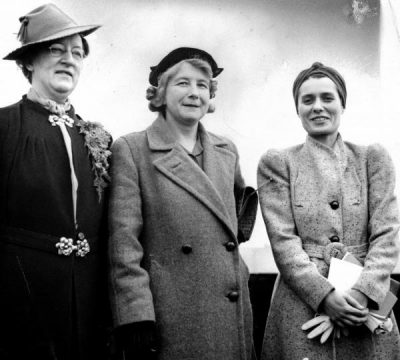#91 Nurturing postwar feminism
From Left to Right: Maternalism and Women’s Political Activism in Postwar Canada
by Brian Thorn
Vancouver: UBC Press, 2016
$32.95 / 9780774832090
Reviewed by Lisa Pasolli
First published Feb. 19, 2017
*
Canadian women, far from being trapped in suburban homes and domesticity in the late 1940s and 1950s, were active across the political spectrum from the Communist Party of Canada (CPC), to the Co-operative Commonwealth Federation (CCF, later the NDP), and to the Social Credit Party.
In From Left to Right: Maternalism and Women’s Political Activism in Postwar Canada, Brian Thorn considers influential women in all these political movements and finds that, whatever their politics, their activism continued to be imbued by maternalism – an emphasis on the domestic sphere and a veneration of women’s biological capacity to mother and nurture.
 Reviewer Lisa Pasolli estimates that From Left to Right will be of interest to scholars specializing in maternalism, feminism, and maternal feminism, as well as more recent approaches including matricentric feminism, femocracy, and grassroots welfare rights feminism. – Ed.
Reviewer Lisa Pasolli estimates that From Left to Right will be of interest to scholars specializing in maternalism, feminism, and maternal feminism, as well as more recent approaches including matricentric feminism, femocracy, and grassroots welfare rights feminism. – Ed.
*
Growing up in Southern Alberta, I often encountered politically active women who insisted they didn’t “need” feminism because they were already respected members of their families and communities.
Their comments were made in a rural and agricultural context: if they performed traditionally female roles in their families, on the farm, in the home, in their churches, and in their communities, they said, those roles were highly valued and they considered themselves, and were considered, equal partners with their husbands. Feminism did not resonate with them because they associated it with a political rejection of traditional family values, motherhood, femininity, Christianity, and a rural way of life.
It’s possible to see a disconnect in these women’s rejection of feminism even as they were engaging in the world of politics, a sphere traditionally reserved for men. This seeming contradiction is at the heart of Brian Thorn’s book, From Right to Left: Maternalism and Women’s Political Activism in Postwar Canada. Thorn profiles women in the 1940s and 1950s who were active at all points along the political spectrum, including often-overlooked female members of the right-wing Social Credit Party (SCP) who foreshadowed the rural women in the community in which I lived.

Women on the right, Thorn argues, “rhetorically opposed the expansion of women’s roles” while actively pursuing political change and reform. In doing so, they mobilized the language and ideology of maternalism, which emphasized motherhood “as part of a strategy to reconceptualise the home and family as a place of radicalism” or “at least activism” (p. 6).
But it was not just right-wing women who saw motherhood and the domestic sphere as the source of women’s political empowerment. Thorn also offers close analyses of women’s work on the left, specifically those who were members of the Co-operative Commonwealth Federation (CCF) and the Communist Party of Canada (CPC), and concludes that maternalism was a common thread “from right to left.”

Indeed, he argues, the use of a maternalist ideology led to an “increase in women’s social and political activism” on the right and the left in an era often considered to represent women’s conservative retreat to home and family (p. 4).
Thorn’s study offers interesting glimpses into the lives and work of many politically active women in postwar Canada, from prominent CCF-ers Laura Jamieson and Grace McInnis, to influential SCP women like Ethel Wilson, to little known but no less important mid-level members in all three parties.
These biographical profiles will be useful starting points for any historian interested in this era of women’s history in Canada. The bulk of Thorn’s study, though, is taken up with careful analysis of the issues around which these women mobilized, namely peace and anti-war activism, unions, and juvenile delinquency. Thorn’s work shows that women in all three parties, especially those with a populist orientation, saw “modern capitalism’s hold on society” as the source of social problems (p. 147).

Yet the solutions they proposed were quite different. Women on the right, Thorn shows, “sought a return to traditional Christian values in order to solve modern problems,” while women on the left “sought class-based, statist, and social democratic solutions” including a strengthening of the welfare state. They all considered the “uniquely female value system” of care, nurturance, and motherhood, though, as providing the path towards those solutions (p. 147).
One of Thorn’s central arguments is that politically active maternalist women of the 1940s and 1950s, even if their ideologies were ultimately conservative, “laid the foundations” for second-wave feminism. He also suggests, however, that his study should be considered part of a body of scholarship which “eschew[s] the use of the wave metaphor” because twentieth century feminism was a “continuing process of activism” (p. 5).
These two assertions seem to sit together uneasily, in the sense that Thorn’s argument relies on the wave metaphor while at the same time rejecting it. Some of this uneasiness could have been alleviated by a more careful discussion of the relationship between maternalism, feminism, and “maternal feminism.” Thorn opens by saying that none of the women in his study are feminists, yet by the latter chapters he readily parallels their work to first-wave feminism and even “social feminism” (pp. 82-85).
Thorn is right in saying that the women of the 1945-60 period are a significant part of the whirls, ebbs, and flows of twentieth century women’s activism, but what seems to be missing here is a more careful unpacking of the currents that linked them to the feminists who preceded and followed. Thorn makes the important argument, for example, that “with the decline of maternalist ideology, women’s activism in all three parties went into decline” just as the second wave was beginning to crest (p. 151).

Given that Thorn insists that these postwar maternalists were laying important groundwork for the second wave, it would have been helpful to have a clearer picture of the what linked the pre- and post-1960s activists. How, for example, were maternalist arguments taken up or rejected by the different feminisms of the second wave, including those represented in the public service “femocracy,” grassroots welfare rights feminism, and feminists in formal party politics?
Thorn concludes that the “linking of women with motherhood, and the portrayal of women as being essentially mothers, is a relic of a bygone era” (p. 152), but I wonder if such a definitive statement can be made.
For one thing, not all women in Canada’s past were able to mobilize their motherhood as a source of political power, especially those marginalized by racial discrimination, colonialism, and poverty. That means that today, for example, an emphasis on maternal empowerment remains embedded in demands for Indigenous “resistance, reclaiming, and recovery,”[1] as well as in ongoing theorizing about “matricentric feminism” and its relationship to politics.[2]
The most significant contribution of Thorn’s study, in my view, is that it prompts us to think deeply about the strategic use of motherhood and family in activist and feminist movements, both in the past and the present. Motherhood continues to be understood as both the source of women’s oppression and as a source of political power; confronting the complexity of these positions is necessary in any conversation about feminist coalition-building.
Thorn’s centring of maternalism and the similarities between women on the right and left in postwar Canada necessarily complicates our historical view of women’s activism in Canada, and in doing so enriches our contemporary conversations.
*

Lisa Pasolli teaches history and women’s and gender studies at St. Francis Xavier University in Antigonish, Nova Scotia. Her research explores child care and feminist politics in Canada’s past and present, and she is the author of Working Mothers and the Child Care Dilemma: A History of British Columbia’s Social Policy (UBC Press, 2015), which won the Canadian Historical Association Clio Prize (for best academic book about British Columbia) and was a finalist for the Basil Stuart-Stubbs Prize, both in 2016.
*
The Ormsby Review. More Readers. More Reviews. More Often.
Reviews Editor: Richard Mackie
Reviews Publisher: Alan Twigg
The Ormsby Review is hosted by Simon Fraser University. The Advisory Board consists of Jean Barman, Wade Davis, Hugh Johnston, Patricia Roy, David Stouck and Graeme Wynn.
—
BC BookWorld
ABCBookWorld
BCBookLook
BC BookAwards
The Literary Map of B.C.
The Ormsby Review
[1] D. Memee Lavell-Harvard and Kim Anderson, eds. Mothers of the Nations: Indigenous Mothering as Global Resistance, Reclaiming and Recovery (Bradford, ON: Demeter Press, 2014).
[2] Andrea O’Reilly, ed., Matricentric Feminism: Theory, Activism, Practice (Bradford, ON: Demeter Press, 2016).